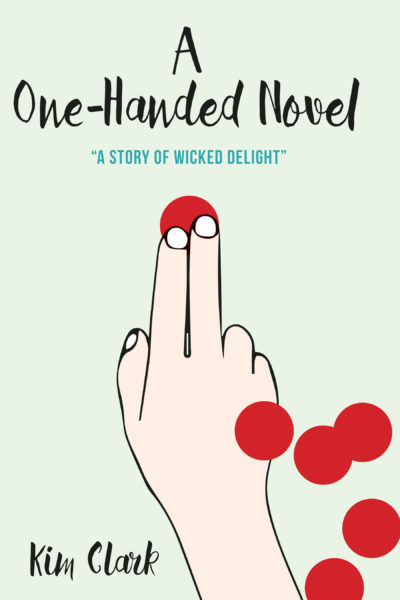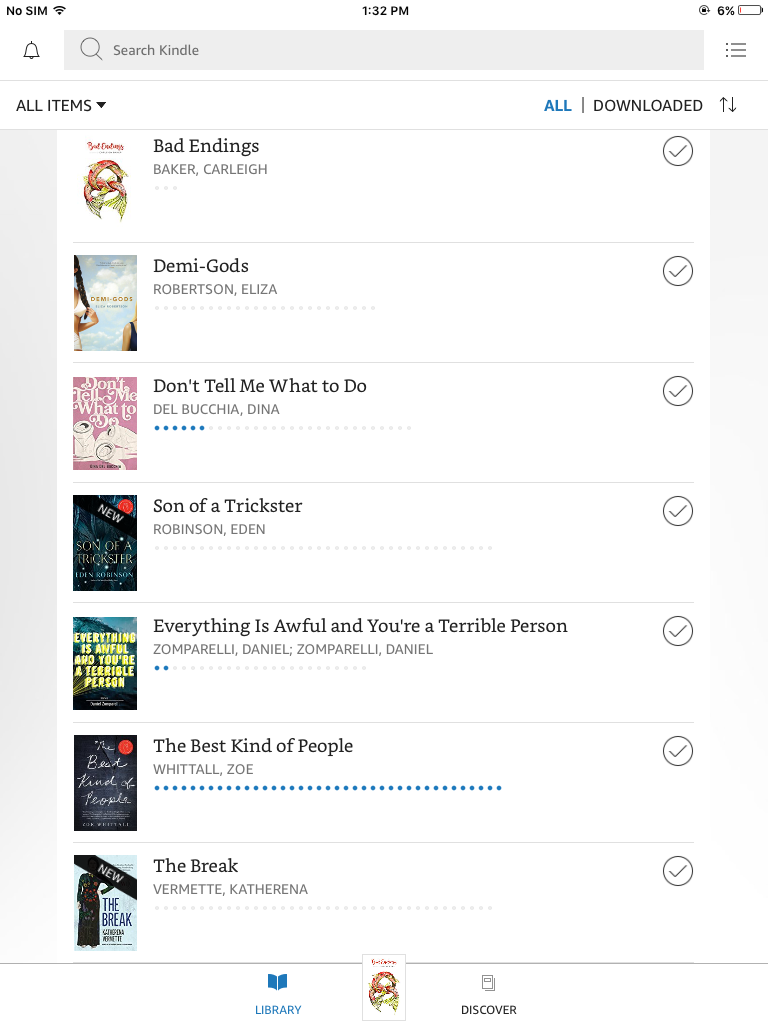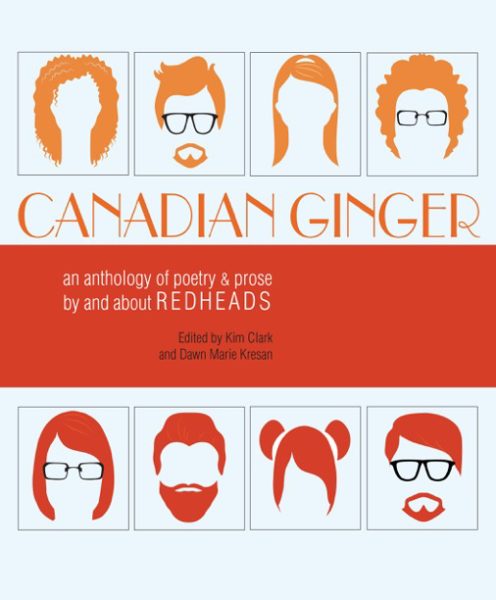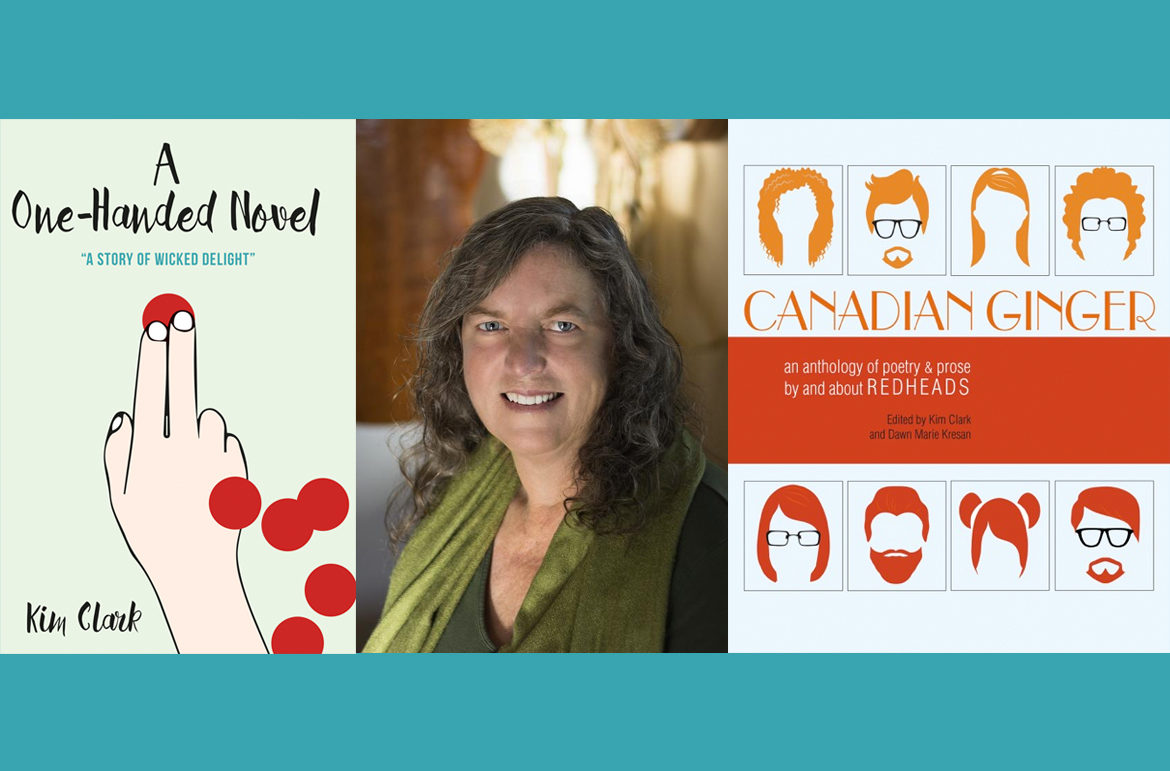Kim Clark is a Canadian author, poet, and playwright. Clark has published short fiction and poetry, and co-edited an anthology last year called Canadian Ginger. She’s also been a finalist in Theatre BC’s Playwrights Competition and has a novella under option for a feature-length film. Clark’s first full-length novel, A One-Handed Novel, was published in February 2018. For someone who didn’t start writing until after her forties, that’s a long list of accomplishments.
You’ve published fiction, poetry, and plays. How did you get started?
A diagnosis of MS made my future sketchy. I figured if I was going to be crippled I’d better find something to do, a way to be, that would be interesting, fulfilling, and doable in a wheelchair. I chose writing (sounds far-fetched, I know, and I was told it couldn’t be done THAT way), joined a writing group, completed a Creative Writing degree and just wrote, learned, wrote, learned… Wait, I’m still doing that! I have more to say, too, about light MS changes in my brain affecting my perception/appreciation of words and letters, but that’s another story.
“[I]t’s incredibly difficult to find disabled characters that aren’t vilified, infantilized, or reduced to inspiration. I wanted to try.”
How do you find writing in different genres, and what do you like and dislike about it?
There are challenges and freedoms in each genre. When one becomes unwieldy—like the novel, which jerked to a halt several times—I can turn to another—say, an erasure poem. Different goal, different method, and enough time away (hopefully!) from the roadblock to go back to it with renewed energy from a fresh direction. This all sounds great, doesn’t it? The drawback is gigabytes of orphaned projects.
 Your 2011 collection, Attemptations (Caitlin Press), includes a story called “Six Degrees of Altered Sensation,” where a single woman with MS is given the startling news that her body is only capable of having six more orgasms. She decides “it’s either buck up or fuck up.” Was this the starting point for A One-Handed Novel?
Your 2011 collection, Attemptations (Caitlin Press), includes a story called “Six Degrees of Altered Sensation,” where a single woman with MS is given the startling news that her body is only capable of having six more orgasms. She decides “it’s either buck up or fuck up.” Was this the starting point for A One-Handed Novel?
It WAS the starting point! But the story kept going in my head, demanding more pages.
A One-Handed Novel’s protagonist, Melanie, has MS. How much of yourself did you include in Melanie’s character?
I included a fair bit of my own progressive MS experience with its odd symptoms. For example, the title, A One-Handed Novel, is based on my one-handed typing. My dominant left hand has lost its small-motor skills, so I’ve had to teach my right hand to do everything and to do it mostly alone. Ditto for my protagonist, Melanie.
What about A One-Handed Novel made it a story you knew you needed to write?
Disability is part of humanity and society that we’re still uncomfortable with. Medical conditions are fascinating. So is sex. Both are hard (no pun intended) to write, especially from the inside. Also, it’s incredibly difficult to find disabled characters that aren’t vilified, infantilized, or reduced to inspiration. I wanted to try. Using fiction to do that gave me the freedom to add speculative aspects as well, because, “What if…?”
While A One-Handed Novel begins with a disabled protagonist surrounded by a cast of able-bodied friends, the sequel I’m working on now has four main characters with different disabilities.
“Disability is part of humanity and society that we’re still uncomfortable with.”
Your work has a lot of commentary on women’s sexuality. Can you tell us about including that in A One-Handed Novel, without giving too much away?
Well, I’m a woman. I wanted to include sex, both the pleasures and the pressures (social, personal, and medical) surrounding it. Orgasms have benefits. It’s complicated!
What do you surround yourself with when you write? Music? Do you have favourite snacks or drinks?
I like to change it up but have a general preference for white noise. Half a gallon of coffee (I use a massive sippy cup) in the morning and Hawkins cheezies (my good hand doing double duty) in the afternoon works for me!
What are you reading these days? Show us your #Shelfie
Though I still love the feel of books, my iPad is becoming my new bookshelf these days. It’s easier to manage with one good hand than pages.

Do you have any BC books you’d like to recommend?
I’d recommend Weekend by Jane Eaton Hamilton. I loved those messy lives crammed into an intense few days.
What is the one book that you wish you wrote, and why?
I wish I’d discovered an unusual style format as successfully done as Anakana Schofield’s Martin John.
Who is your favourite hero/heroine (fictional or real)?
The woman I most admire is my writing mentor Betty Keller (winner of the Lieutenant Governor’s award and the Gray Campbell Distinguished Service Award) who I’ve worked with for about fifteen years. She’s brilliant, practical, and generous. Betty’s heroically resuscitated more than a few fictional characters with one hand while setting her crab traps with the other.
 Last year your anthology Canadian Ginger (Oolichan Books), co-edited with Dawn Marie Kresan, was published.What was the impetus for the collection and why did you want to be involved?
Last year your anthology Canadian Ginger (Oolichan Books), co-edited with Dawn Marie Kresan, was published.What was the impetus for the collection and why did you want to be involved?
I was noticing the growing numbers of redhead memes and comments on Facebook (social media has hidden perks!) and being a ginger myself I thought, hey, this tiny redhead percentile has historic, cultural, and personal significance. What a cool book idea! I reached out to Dawn Kresan, not only because she’s a Canadian ginger writer but because we both have MS. Kindred conditions, lol?
The anthology includes poems, short stories, essays, and drama excerpts from writers across Canada. How did you and your co-editor select the pieces? What factors did you consider and seek to balance?
Most work we easily agreed on after a yes-no-maybe reading process. The “maybes” took some discussion. We wanted a balance of genres mostly and we had a structural idea of how to arrange the pieces, but the submissions begged considerable adjustments to that structure.
P.S. Rejection letters are tough and I’m sorry we couldn’t include all submissions!
Do you have a favourite piece in the anthology or a contribution that surprised you?
I have a couple of favourite poems, “Freckles” by Diane Tucker and “Heather Mead” by Kim Goldberg, one about origins and the other about, well, freckles.
Funny, honest, heartbreaking, and hopeful, A One-Handed Novel offers a fresh take on independence and disability, ambition and love, and the communities that help us cope when our bodies and our desires are ever-changing.
Canadian Ginger explores the meaning, myths, and stereotypes of being a ginger. This unconventional and fun anthology brings together poems, short stories, essays, and drama excerpts from writers across Canada to tell the comical, powerful, tender, sexy, and sometimes tragic tales about their ginger tresses.
Kim Clark is a Canadian author, poet and playwright. If you’re in Vancouver, you can see Kim Clark at Growing Room, Room Magazine‘s feminist literary festival on March 1-4, 2018, where she will be participating in three panels.

